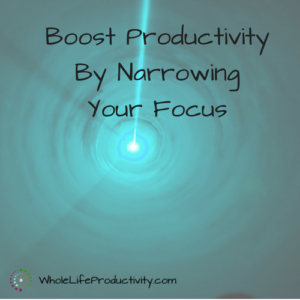Making Systems To Support Us
My friend Therese and I were recently talking about her son’s ADHD diagnosis, and that she had also been diagnosed at the same time. She’s a productive and happy adult, and she was telling me much of that stems from having developed systems to support her weaknesses.
The systems that help our weaknesses are really the only ones we have to try for. We have to recognize our weaknesses and find tools to help us past them. And it doesn’t matter if it is due to neurodivergence, or if it is something brought on by stress, overwhelm and overextension.
First Step: Writing Everything Down
One thing that is constant across every productivity system out there is the capture of the details. Putting all of the appointments, tasks, notes, thoughts, reminders, ideas and whatever else in a place other than your brain is the first step in making systems to support you. No system (at this point in time, thank goodness) can access that information inside your head.
Difficulty Remembering Appointments
It’s almost impossible to remember you have an appointment if you aren’t aware of it. Using a calendar and blocking out not only time for the appointment, but any transit time and preparation time is the first step. Making sure that you are aware of the appointments, either by a frequent scan of your calendar, or using a smart watch or phone to buzz at the appropriate times can help.
I use Google Calendar not only to track my personal and work events, but also to see my husband’s and daughter’s schedule, and the schedules of various organizations I belong to. I use it for planning the blog as well. I review my calendar for the week on Sundays, my day as I write up my bullet journal entry, and my work appointments first thing on the workday. But having those alarms keeps me on track.
Misplacing Belongings
Therese has an issue losing things. So she minimizes what she carries. Her debit card is on a pocket on her phone case, and her keys are on a bracelet she wears. Recently she started wearing reading glasses, and after losing two pairs started wearing them on a cord around her neck.
I move working spaces frequently. Between my writing studio, my home office, my client office, my employer’s office and my favorite chair in the living room, I move around a lot. And it is incredibly disruptive to realize I left something I really needed in another physical space. I carry a bag around with me, even in my house. When I am about to shift physical spaces, I sweep everything loose in front of me into the bag. I can only do this by making sure my workspaces are completely free of clutter; but I have not left anything in another room or building in months since I implemented this.
Losing Track of Time
It is so nice when we can be absorbed in something and really doing the deep work on it. Until we realize that we needed to be working on something else, or that we had to be somewhere else an hour ago.
Therese uses a Pomodoro app on her watch. I have gotten in the habit of looking at my calendar, then asking my phone to set a timer for the amount of time I have before I move on. I also have my phone ask me if I am “on track” at certain times so that I don’t sidetrack too badly.
Lack of Concentration
My mind seems scattered at times, and I have trouble pulling in the monkey brain. There are days when it is easy to concentrate, and there are days when it is hard. And sometimes it is task dependent.
I use audio and olfactible cues to help me focus. I have a special candle in my writing studio that I only burn when I am writing articles. This only works when I am in this particular physical space – I can’t imagine my client would be too appreciative of open flame. So when I can’t use the candle, or sometimes to supplement it, I use a track by LoFi Girl called Cozy Winter. Just the first few notes of it makes me settle in and focus.
Therese, with her ADHD, uses something that she discovered by accident. As an accountant, she found that during her first tax season that drinking that extra cup of coffee didn’t make her jittery – it made her be able to focus. She uses coffee whenever she needs to be able to really get into things.
Being Unable to Remember Details
When we are stressed, overwhelmed or exhausted, it can require a huge effort to recall what we did yesterday. And further back? Not much chance of that.
This goes along with the “writing everything down”. I am surprised at how many people don’t take notes during meetings. Since moving to my OneNote planner at work, I start a new page for every meeting. Just yesterday my client asked when a meeting with a vendor occurred. And because I name my meeting pages [Vendor] and the date, I just had to glance at the page list to tell him.
I take notes on everything, even if they are scribbled on sticky notes and transferred somewhere else later. It is the only way I know to keep track of details.
Losing Track of Papers/Files
There is so much information in the world. It used to all be on paper. But now it is electronic. And that doesn’t make it more trackable. (Sure, there is search, but only if you are in specific places, and even then it may not work).
When I had a lot of papers for Girl Scouts, I kept everything in a zippered binder. When I was a teacher, I used a zipper filing system (I actually still use this to process papers at my desk). By keeping everything in one place, I know where the papers are all the time.
Right now I am the treasurer for a local non-profit chapter. I keep all of my papers in a folder in a specific bag. When I go to meetings, I grab the bag, knowing everything is all in there. I also keep all of the electronic files in a specific folder on Google Drive, and can get to them on my phone if should need to when out of the house.
It is important to approach your electronic files the same way. Set up your email filing so that you get rid of the garbage, and file things relating to the same thing together. Same with your hard drive. If there are files that go with your email folder, set up a folder structure that matches your email.
Finding Your Own Solutions
I hear far too often from people who are looking at a particular productivity system and want to know my opinion on it. I don’t mind sharing my experience. But at the same time, a productivity system that doesn’t address the person’s specific weaknesses is going to work poorly.
In order to find your solutions, you need to know your weaknesses.
I could never be successful with a system that didn’t have some sort of physical reminder of appointments. I could never be successful with a system that didn’t move tasks forward from day to day. I could never be successful with email filing that consisted of a ginormous inbox and using search alone to find things.
Your solutions have to solve your problems.
In the End…
In the end it all comes down to finding what works for you. Notice where the pain points are, and seek solutions that address those, and work well with your other solutions.





2 Comments
Susan Johnson
Laura — this is the best summary of common productivity issues plus options I have seen. Thanks!
Heather Wilson
I completely agree! I have my routines and that is what helps keep me on track. Those routines cover everything from planning my week and the tasks I need to do to keep things running in the house. I also have to write everything down or it will be forgotten. I do need to work on cleaning up my digital life though. I did clean through pictures on my phone during the new year, but I need to work on cleaning up my hard drive both personal and work. I may look to move my meeting notes for work to One Note as well, so thanks for that tip! I do need to clean up my current OneNote at work, as it has a lot of old information in it!